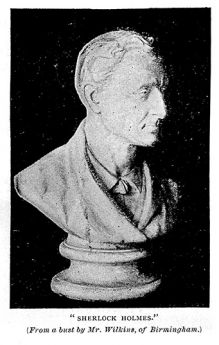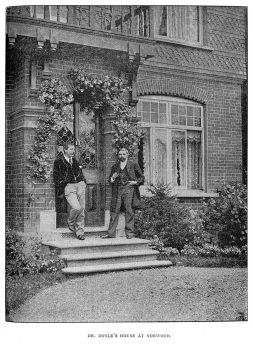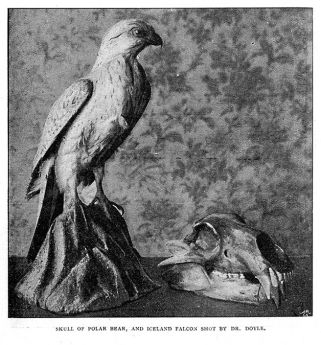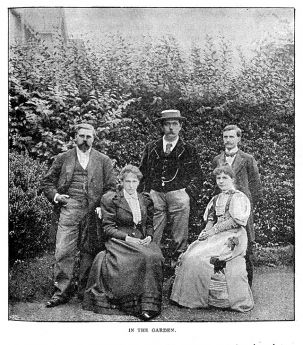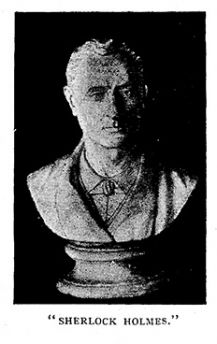A Chat with Conan Doyle
A Chat with Conan Doyle is an interview of Arthur Conan Doyle written as an article by Robert Barr published in The Idler in october 1894. Illustrated with 7 photos by Messrs. Fradelle and Young.
Photos
- Photos from The Idler (october 1894)
-
Dr. Doyle in the chair.
-
"Sherlock Holmes."
-
Dr. Doyle at work.
-
Dr. Doyle's house at Norwood.
-
Skull of polar bear, and Iceland falcon shot by Dr. Doyle.
-
In the garden.
-
"Sherlock Holmes."
A Day with Dr. Conan Doyle

(october 1894, p. 340)

(october 1894, p. 341)

(october 1894, p. 342)

(october 1894, p. 343)

(october 1894, p. 344)

(october 1894, p. 345)

(october 1894, p. 346)

(october 1894, p. 347)

(october 1894, p. 348)

(october 1894, p. 349)
BY AN "IDLER" INTERVIEWER.
(Photographs by Messrs. Fradette and Young.)
In the very beginning I wish to set down the fact that I am not a professional interviewer, but that I have some acquaintance with the principles of the art. The observant reader will notice that I understand the business because I have managed to run in five capital "I's" in the first few lines of this article. There you have the whole secret of interviewing as practised A. D. 1894 in England. The successful interviewer blazons forth as much of his own personality as possible; using his victim as a peg on which to hang his own opinions. If the interviewer could be induced to hang himself as well as his opinions the world would be brighter and better.
But the interview in England is an imported article ; it is not native to the soil. In America you get the real thing, and even the youngest newspaper man there understands how it should be done. An interviewer should be like a clear sheet of plate glass that forms the front window of an attractive shop, through which you can see the articles displayed, scarcely suspecting that anything stands between you and the interesting collection.
To show the practical difficulties that meet an interviewer at the very outset, here was a victim who absolutely refused to be interviewed.
"What has the public to do with an author's personality?" he asked. "I vowed more than two years ago that I would never see an interviewer again."
"But you are going to America—"
"Ah, in America it is a different thing. One should adapt one's self to the ways of a country."
"But apart from personality, suppose we chat about literature."
"Well, let us stick to literature then."
I pulled out my note-book and pencil, and, looking across at my victim, solemnly said—
"Now, Conan Doyle, talk."
Instead of complying with my most reasonable request the novelist threw back his head and laughed, and, impressed as I was with the momentousness of the occasion, so hearty and infectious is his laugh, that after a few moments I was compelled to join him.
We had looted two comfortable wicker chairs from the house, and were seated at the farther end of the long lawn that stretches from the Doyle residence towards the city of London. It is one. of those smooth, exceedingly green, velvety lawns to be found only in England, yet so easy of manufacture, for, as the Oxford gardener said to the American visitor, all you have to do is to leave the lawn outdoors for five hundred years or so, cutting and rolling it frequently, and there you are. Little white hard rubber golf balls lay about on the grass like croquet balls that had shrunk from exposure to the weather. Mr. Doyle is a golf inebriate, and practises on this lawn, landing the balls in a tub when he makes the right sort of a hit, and generally breaking a window when he doesn't.
I put away my note-book and pencil.
"I have a proposal to make," I said. "You and I have frequently set the world right and solved all the problems with no magazine editor to make us afraid. We have talked in your garden and in mine, at your hospitable board and at mine, at your club and at mine, on your golf ground and — yes, I remember now, I haven't one of my own ; now l know your views on things pretty well, so I will 'fake' an interview, as we say in the States."
"But that wouldn't be quite fair to the readers of THE IDLER, would it?" objected Doyle, who is an honest man, and who has never had the advantage of a newspaper training.
"Quite fair, I should think. They would get your opinions on things, which is the main point. Your opinion and mine are always the opposite of each other. All I would have to do would be to remember what I thought on any subject, then write something entirely different, and I would have Conan Doyle. No literary man ever agrees with any other literary man. He sometimes pretends to like the books another fellow has written, but that is all humbug. He doesn't in his heart ; he knows he could have done them better himself."
"Oh, you're all wrong there, all wrong-entirely wrong. Now, if I had to choose my critics I would choose my fellow workers or school-boys."
"Just what I said. You are placing the other authors on a level with school-boys! That is worse than—"
"Listen to me. A fellow author knows the difficulties I have to contend with; he appreciates the effect I am trying to attain; his criticism, even if severe, would be helpful and intelligent.
"A school-boy, on the other hand, seems to give his verdict on a book by intuition, but he rarely makes a mistake. See how the school-boys of the world have made 'Treasure Island' their own. Of course I would not expect an accurate estimate of 'Robert Elsmere' from a school-boy."
"I suppose an author would hardly like to slate another author's work — publicly. Besides, he would be compelled, as a matter of self-protection, to keep up the pretence that there is such a thing as literature in· England at the present moment. But there is Mr. Howells, who has no English axe to grind, and he, from the calm, serene, unprejudiced atmosphere of New York, frankly admits that literature in England is a thing of the past, and that the authors of to-day do not understand even the rudiments of their business. Of course you agree with him?"
"I think there never was a time when there was a better promise. There are at least a dozen men and women who have made a deep mark and who are still young. No one can say how far they may go. Some of them are sure to develop, for the past shows us that fiction is an art which improves up to the age of fifty or so. With fuller knowledge of life comes greater power in describing it."
"A dozen! You always were a generous man, Doyle. Who are the talented twelve, so that I may cable to Howells?"
"There are more than a dozen. Barrie, Kipling, Mrs. Olive Schreiner, Sarah Grand, Miss Harraden, Gilbert Parker, Quiller-Couch, Hall Caine, Stanley Weyman, Anthony Hope, Rider Haggard, Crockett, Jerome, Zangwill, Clark Russell, George Moore — many of them under thirty and few of them much over it. There are others of course. These names just happen to occur to me."
"You think a man improves up to fifty?"
"Certainly, if he keeps out of a groove and refuses to do his work in a mechanical way. Why, many of the greatest writers in our fiction did not begin until after forty. Thackeray was about forty. Scott was past forty. Charles Reade and George Eliot were as much. Richardson was fifty. To draw life one must know it."
"My experience is that when a man is fifty he knows he will improve until he is sixty, and when he is sixty he feels that improvement will keep right on until he is seventy ; whereas when he is twenty he thinks that perhaps he will know more when he is thirty, but is not sure. Man is an amusing animal. Now I would like an American dozen, if you don't mind."
"I have not read a book for a long time that has stirred me as much as Miss Wilkins' 'Pembroke.' I think she is a very great writer. It is always risky to call a recent book a classic, but this one really seems to me to have every characteristic of one."
"Well?"
"Well!"
"That is only one. Don't you read American fiction?"
"Not as much as I should wish, but what I have read has, I hope, been fairly representative. I know Cable's work, and Eugene Field's, and Hamlin Garland's, and Edgar Fawcett's, and Richard Harding Davis'. I think Harold Frederic's 'In the Valley' is one of the best of recent historical romances. The danger for American fiction is, I think, that it should run in many brooks instead of one broad stream. There is a tendency to over-accentuate local peculiarities ; differences after all are very superficial things, and good old human nature is always there under a coat of varnish. When one hears of a literature of the West, or of the South, it sounds aggressively sectional."
"Sectional? If it comes to that who could be more sectional than Hardy or Barrie? — the one giving us the literature of a county and the other of a village. You know that a person in a neighbouring village said of Barrie that 'he was no sae bad fur a Kerrimuer man.' When you speak of a section in America you must not forget it may be a bit of land as big as France."
"Barrie and Hardy have gained success by showing how the Scotch or Wessex peasant shares our common human nature, not by accentuating the points in which they differ from us."
"Well, I think Howells is demolished. What do you think of him and of James?"
"James, I think, has had a great and permanent influence upon fiction. His beautiful clear-cut style and his artistic restraint must affect everyone who reads him. I'm sure his 'Portrait of a Lady' was an education to me — though one has not always the wit to profit by one's education."
"Yes, James is a writer of whom English people ought to be proud. What a pity it is there is no American like him. Still, thank goodness, they have William Dean Howells over there. I love Howells so much that I feel sure you must have something to say against him; what is it?"
"I admire his honest earnest work, but I do not admire his attitude towards all writers and critics who happen to differ from his school. One can like Valdes and Bourget and Miss Austen without throwing stones at Scott and Thackeray and Dickens. There is plenty of room for all."
"But there is the question of art."
"We talk so much about art that we tend to forget what this art was ever invented for. It was to amuse mankind to help the sick and the dull and the weary. If Scott and Dickens have done this for millions they have done well by their art."
"You don't think, then, that the object of all fiction is to draw life as it is?"
"Where would Gulliver and Don Quixote and Dante and Goethe be if that were so? No; the object of fiction is to interest, and the best fiction is that which interests most. If you can interest by drawing life as it is, by all means do so. But there is no reason why you should object to your neighbour using other means."
"You do not approve of the theological novel, then?"
"Oh, yes, I do, if it is made interesting. I think the age of fiction is coming-the age when religious and social and political changes will all be effected by means of a novelist. Look within recent years how much has been done by such books as 'Looking Backward,' or 'Robert Elsmere.' Everybody is educated now, but comparatively few are very educated. To get an idea to penetrate to the masses of the people you must put fiction round it, like sugar round a pill. No statesman and no ecclesiastic will have more influence on public opinion than the novelist of the future will have. If he has strong convictions he will have wonderful facilities for impressing them on others. Still, his first business will always be to interest. If he can't get his sugar right people will refuse his pill."
At this point nature revolted. She thought the subject too dry and she proceeded to wet it down. A black thunder cloud came up over the Crystal Palace, and the first thing we knew the shower was upon us. Both of us luckily knew enough to come in out of the rain. Two men hastily grasped two wicker chairs and bolted for the house, leaving literature to take care of itself in the back garden.
Conan Doyle's study, workshop, and smoking-room is a nice place in a downpour, and I can recommend the novelist's brand of cigarettes. Show me the room in which a man works and I'll show you — how to smoke his cigarettes.

